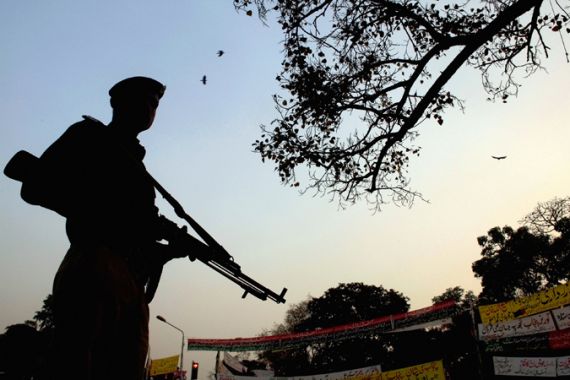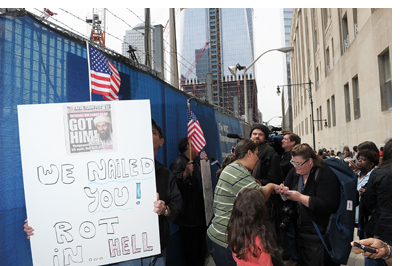The cruelest decade
Pakistan did not treat 9/11 with the necessary levels of introspection, as a result it experiences great instability.

 |
| Since 9/11, at least 3,000 soldiers and over 30,000 civilians have died in Pakistan [GALLO/GETTY] |
Forgive me, faith, for never having any.
Ten years after worlds collided on September 11, 2001, Pakistan remains a post-9/11 state with a pre-9/11 mindset. What is worse, the United States has also failed to treat Pakistan for what it is: A country stuck in the past.
Good judgment comes from bad experiences, they say. In Pakistan, every year of the 9/11 decade has been crueler than the last. Extremists have increasingly attacked civilians, the Pakistan army and intelligence services alike. At least 3,000 soldiers and over 30,000 civilians have died at their hands. We have buried former Prime Minister Benazir Bhutto and said goodbye to a courageous and charismatic governor, Salman Taseer.
This year has been particularly bad, marked by international allegations of duplicity and collusion with Osama bin Laden, mounting criticism at home over the failure to intercept an attack on a major naval base and the murder of an investigative journalist for which fingers have been directly pointed at the top intelligence agency.
In Pakistan, every day is 9/11
|
“The Pakistan Army, the self-styled guardian of national security and foreign policy here, just didn’t ‘get’ 9/11.” |
We have relived 9/11 everyday. And yet, as we have picked through the debris, the only lessons we seem to have leant are the wrong ones. What is ever clear now is that the Pakistan Army, the self-styled guardian of national security and foreign policy here, just didn’t ‘get’ 9/11.
As terrorism triggered the longest war in American history, the Pakistan Army refused to acknowledge that the rogue elements it had fattened for decades were part of the problem. It had heard these whispers before but always decried them to preserve its sense of security – and sanity. Thus, nothing changed on September 11. And ten years later, the generals are still not ready for the course corrections that should follow: giving up non-state actors as a policy instrument; acknowledging the existence of the Quetta Shura; dismantling the old ways of exerting influence in Afghanistan; prosecuting the Lashkar-e-Taiba, and so on.
What is worse: While the army has failed, the political establishment never even tried.
The May 2 raid in which US Special Forces killed Osama bin Laden in Pakistan was a humbling experience for Pakistan’s security establishment. But for the civilians, it was an opportunity brilliantly disguised as an insolvable problem – a chance to correct, even if slightly, the country’s civil-military imbalance.
Top army commanders met at the General Headquarters in Rawalpindi to chalk out a damage control plan. The military press releases that followed warned of “dire consequences” if Pakistan’s sovereignty were violated again and promised that US personnel in the country would be reduced to the minimum required.
 |
| The US raid which killed Osama bin Laden was a humbling experience for Pakistan’s security establishment [GALLO/GETTY] |
Next, the military leadership met a select group of journalists and charged that the government had not discussed the war on terror with the Army “even once in three years”. A more serious allegation was that the Pakistan Embassy in Washington DC had issued more than 7,000 visas to Americans without security clearance.
Humbled and silent
In the face of the Army onslaught, the government retreated behind a wall of silence. Information minister Firdous Ashiq Awan and foreign secretary Salman Bashir refused to comment on the military’s statements. The prime minister’s secretariat gave a brief non-response. Only Ambassador Husain Haqqani in Washington spoke up: “Let’s also ask who issued visas to Osama bin Laden to come to Pakistan.”
At the May 13 in-camera joint session of parliament, ISI supremo Gen. Shuja Pasha admitted an intelligence failure on bin Laden and surrendered himself for accountability before parliament. He got the desired response: The prime minister and several MPs refused to accept his resignation.
For a military trained to project overwhelming power but not to expect accountability, a precedent could have been set by letting Pasha go. But the prime minister was thinking about protecting his government – which entails being on the right side of the security establishment – not correcting decades-old wrongs done unto democracy, or tilting Pakistan’s civil-military imbalance in favour of civilians. Here was an opening to show the public that the greatest threats to national security were created and compounded by the Army itself. But the prime minister did not seize the moment. The warden of the transition to democracy failed to turn a temporary defeat into the beginning of an enduring victory for democracy.
|
“The US funding anarchy here as an excuse to denuclearise and enslave us.“ |
With the civilian retreat, the Army was back in charge, armed with its woe-is-us-conspiracies, trotting out the usual suspects in importance of their imagined and actual betrayals of Pakistan: The US funding anarchy here as an excuse to denuclearise and enslave us; India stepping up its conspiracy to dismember Pakistan. In media circles the Army found a godsend; someone to represent the slow and painful unraveling of Pakistan in terms of deflowered sovereignty and wounded pride.
Re-thinking relations with India; embarking on economic reforms; giving up ‘non-state actors’ as a policy instrument – much needed to be, and could have been, done in the post-9/11 moment. But Pakistan chose a transactional response best exemplified by what General Musharraf explained were his reasons for signing up for the US war on terror: Because he had been threatened into acquiescence by the Bush administration; and because he wanted to be able to further Pakistan’s interests, that is, to grab the carrots the US was dangling as payment for Pakistani help.
Ironically, the Americans have kept paying us for our Janus-faced help. Even as we have opened supply routes for the US war machine in Afghanistan and helped Americans go after al-Qaeda in the tribal and urban areas of Pakistan, we have at the same time turned a blind-eye to the Afghan Taliban, the Haqqani network and other elements that overtly challenge US interests.
 |
| Pakistan’s military is currently waging a war within its own borders against extremist elements [GALLO/GETTY] |
And here’s the rub: we’ve learnt that we can get away with almost anything. We know full well that in worrying the world, we interest it – and if only for that reason, the world will always give us another chance.
But the United States hasn’t gotten it either. For decades, Washington has been only too eager to throw money at Pakistan in the hope of altering its security paradigm. Expecting strategic returns, it has committed economic assistance and political support to regimes both civilian and military. But what the US hasn’t learned is that if there’s one thing money can’t buy, it’s Pakistan’s strategic outlook – its deep-seated fears about India and a pesky neighborhood to its west. Another thing money can’t help the US understand is that Pakistan’s strategic outlook is run by the Army – and that is what it should have strived to change.
Throughout the history of the Pakistan-US relationship, Washington has been caught between dealing with corrupt civilians and outmoded military men. More often than not, it has chosen to work with the latter.
It is this that had to change post-9/11. As tempting as it was to pick the more organised military over bumbling civilians, the US had to be more resolute and patient with the civilian leadership. Post-9/11, the US should have sought to build a friendship with Pakistan’s people and not merely with its military leaders. But it didn’t do that and the inevitable happened: Osama bin Laden was found wrapped up in the bosom of the Pakistani security establishment.
Hard decisions
Will things change? Possibly, if Pakistan makes some hard choices. But one can’t see why the generals will make them now when they have declined to in the past. If this expectation is true, US-Pakistan relations in particular, and Pakistan’s internal equation in general, will remain locked into a low-level equilibrium trap, at best. At both levels – getting on the right side of world opinion and setting our own house in order – the generals have adopted an unfortunate pragmatism aimed at protecting the lowest common denominator of achievement.
Ten years on, we measure our successes and sacrifice in terms of having retaken control of Swat, counting dead militants and civilians, denying complicity with drone attacks, matching India’s military buildup, and so on. But what is successful about having to re-live 9/11 every day? How do you measure success when everyone is part of the debris?
There are those who say only another cataclysmic event willd finally impel a genuine lurch forward for Pakistan. But we can no longer afford to risk such a game-changer. Today, we have come to a fork in the road and are forced to ask ourselves: “Which road do I take?”
Let us believe there are no mistakes in politics – only lessons. Seize them, Pakistan.
Mehreen Zahra-Malik is Assistant Editor, The News International, Pakistan’s largest English-language daily newspaper. She can be reached at mehreenzahramalik@gmail.com
The views expressed in this article are the author’s own and do not necessarily reflect Al Jazeera’s editorial policy.
